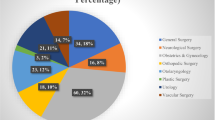Abstract
Introduction: There are a number of factors used to evaluate applicants to orthopedic training programs, including medical school reputation and membership in the Alpha Omega Alpha Honor Medical Society (AOA). It is unknown if these selection factors are weighted more heavily at top ranked, academic orthopedic residency programs. The purpose of this study was to compare these factors between applicants who matched at the top 25 orthopedic residency programs and those who matched at all other orthopedic programs.
Methods: We performed a search to determine the AOA membership status and medical school of origin for each intern in the 2013–2014 residency class whose identity was available publicly. Percentage of residents who belonged to AOA and percentage who had attended a U.S. News top 25 medical school were compared at the top 25 orthopedic programs (based on National Institutes of Health [NIH] funding and U.S. News rank) against all other orthopedic programs.
Results: Orthopedic programs affiliated with departments in the top 25 for NIH funding matched significantly more applicants who belonged to AOA. Orthopedic programs in the top 25 for department or medical school NIH funding, or medical school U.S. News rank, matched significantly more applicants who had attended top 25 medical schools.
Discussion: Top 25 orthopedic residency programs matched more applicants who had attended top 25 medical schools and who were AOA members. These results provide accurate baseline information regarding the applicant pool and are informative of the general trends in the orthopedic surgery match.


Similar content being viewed by others
References
DePasse JM, Palumbo MA, Eberson CP, Daniels AH. Academic characteristics of orthopaedic surgery residency applicants from 2007 to 2014. J Bone Joint Surg Am. 2016;98(9):788–95.
Charting outcomes in the match: characteristics of applicants who matched to their preferred specialty in the 2011 main residency match. National Resident Matching Program.
Charting outcomes in the match: characteristics of applicants who matched to their preferred specialty in the 2014 main residency match. National Resident Matching Program.
Raman T, Alrabaa RG, Sood A, Maloof P, Benevenia J, Berberian W. Does residency selection criteria predict performance in orthopaedic surgery residency? Clin Orthop Relat Res. 2016;474(4):908–14.
Green M, Paul J, Thomas JX. Selection criteria for residency: results of a national program directors survey. Acad Med. 2009;84(3):362–7.
Crane JT, Ferraro CM. Selection criteria for emergency medicine residency applicants. Acad Emerg Med. 2000;7(1):54–60.
Bernstein AD, Jazrawi LM, Elbeshbeshy B, DellaValle CJ, Zuckermann JD. Orthopaedic resident-selection criteria. J Bone Joint Surg Am. 2002;84(11):2090–6.
Campbell ST, Gupta R, Avedian RS. The effect of applicant publication volume on the orthopaedic residency match. J Surg Educ. 2016;73(3):490–5.
Accreditation Council for Graduate Medical Education: Accredited programs and sponsoring institutions. Accreditation Council for Graduate Medical Education; Available from: https://www.acgme.org/acgmeweb/tabid/172/GraduateMedicalEducation/AccreditedProgramsandSponsoringInstitutions.aspx.
Alpha Omega Alpha Honor Medical Society: Locate a member. Available from: http://alphaomegaalpha.org/index.html.
U.S. News & World Report: Best medical schools research 2014. Available from: http://grad-schools.usnews.rankingsandreviews.com/best-graduate-schools/top-medical-schools/research-rankings?int=98fd08.
Blue Ridge Institute for Medical Research: List of NIH research awards. Available from: http://www.brimr.org/NIH_Awards/NIH_Awards.htm.
Wood JS, David LR. Outcome analysis of factors impacting the plastic surgery match. Ann Plast Surg. 2010;64(6):770–4.
Rinard JR, Garol BD, Shenoy AB, Mahabir RC. Successfully matching into surgical specialties: an analysis of national resident matching program data. J Grad Med Educ. 2010;2(3):316–21.
Author information
Authors and Affiliations
Corresponding author
Ethics declarations
Conflict of Interest
Each author certifies that he or she has no commercial associations (e.g., consultancies, stock ownership, equity interest, patent/licensing arrangements, etc.) that might pose a conflict of interest in connection with the submitted article.
Funding
The authors report no external funding source for this study.
Humans and Animals Rights and Informed Consent
No data was collected from humans or animals for this study; all data was publicly available.
Work was conducted primarily at Stanford University and secondarily at the University of California, Irvine.
Rights and permissions
About this article
Cite this article
Campbell, S.T., Chin, G., Gupta, R. et al. The Effect of Medical School Reputation and Alpha Omega Alpha Membership on the Orthopedic Residency Match in the United States. Med.Sci.Educ. 27, 503–507 (2017). https://doi.org/10.1007/s40670-017-0420-6
Published:
Issue Date:
DOI: https://doi.org/10.1007/s40670-017-0420-6




